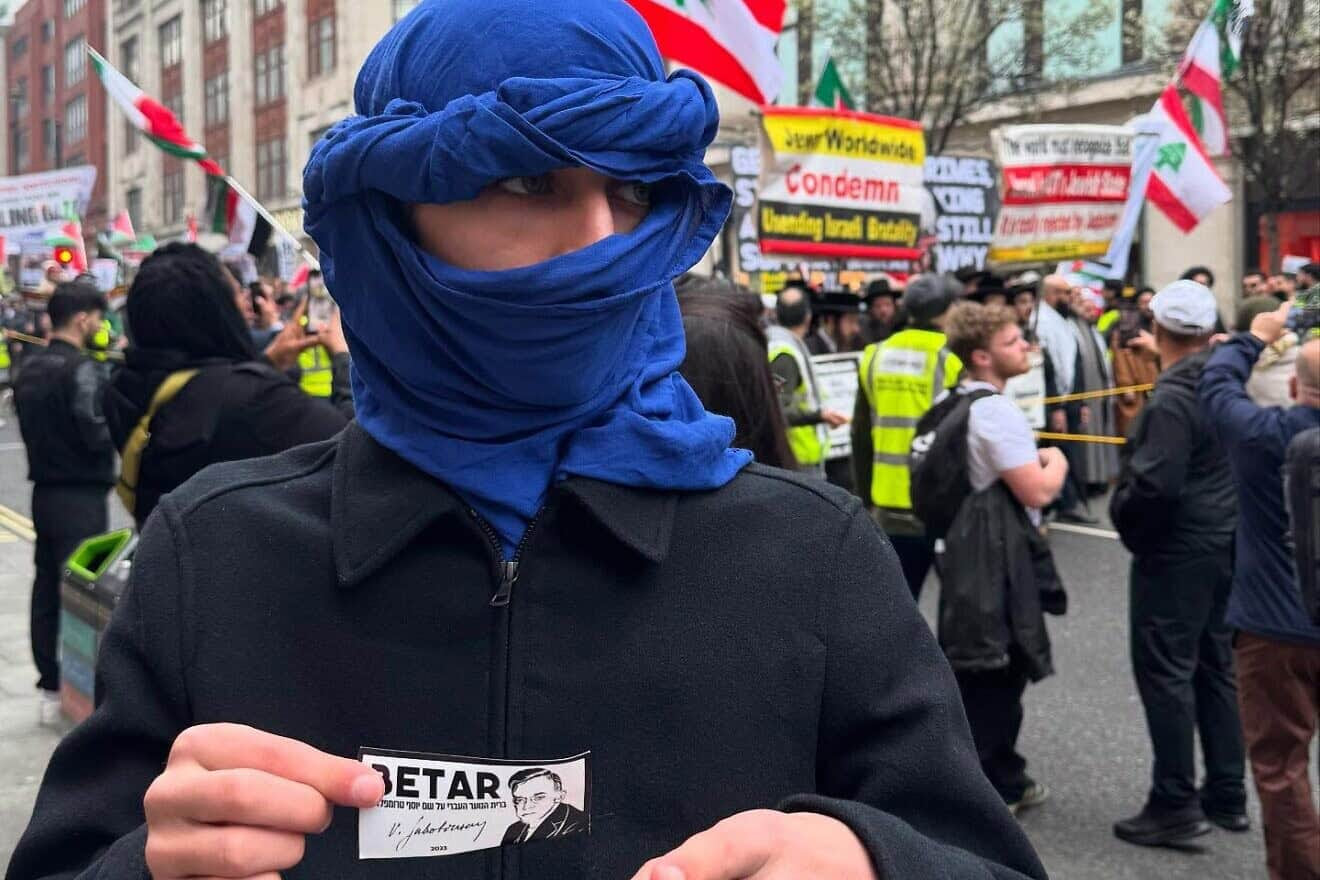“The Diaspora is no longer safe for Jews,” says World Betar’s CEO. “Either fight back with Betar or claim your free one-way flight home to Israel.”
Shanna Fuld
(JNS)
On the eve of Passover, a holiday commemorating the ancient Jewish exodus from Egypt, leaders of the Betar movement gathered at the Jabotinsky Institute in Tel Aviv to issue a bold call for a modern-day exodus: Jews worldwide should either fight against antisemitism and anti-Israel sentiment or leave the Diaspora and come home to Israel.
“It’s fight or flight time for world Jewry. The Diaspora is no longer safe for Jews. Either fight back with Betar or claim your free one-way flight home to Israel,” declared Yigal Brand, CEO of World Betar, echoing the urgency that permeated the gathering.
It’s been nearly a century since the movement has pushed so hard for a return home. Betar, founded in 1923 by early Zionist leader Vladimir (Ze’ev) Jabotinsky, has long been associated with the revisionist Zionist tradition that pushed for self-defense and the right to a Jewish homeland.
Nearly a century after Jabotinsky warned European Jewry of impending disaster, his ideological descendants are raising the alarm with passion. Betar leaders host weekly activities for young people in 35 chapters around the world, including seminars, rallies, carnivals and opening the door for political activism in the name of Zionism. Today, they are working to bolster the movement’s impact.
In the shadow of Oct. 7, 2023—the day Hamas militants invaded southern Israel, killing more than 1,200 and kidnapping 251—Betar officials said their movement has experienced a major resurgence. Leaders from international Betar chapters convened at the Jabotinsky Institute, paying homage to their founder as they examined his original handwritten manuscripts, reviewed his life on film and strategized for what they see as a critical moment in Jewish history.
“There has never been a more dangerous time for the Jewish people since the Holocaust,” Ronn Torossian, vice chairman of Betar Worldwide and chairman of Betar U.S., told JNS. “As Jews are being attacked at Staples in Los Angeles and in the center of Paris, it’s time for us to come home to Israel and stand tall.”
Torossian, an unapologetic Israeli American public relations executive, spoke in a bold and direct tone. His message invoked the founder’s uncompromising stance on Jewish survival. “Jabotinsky traveled the world before the Holocaust and famously said, ‘Liquidate the Diaspora before the Diaspora liquidates you.’”
Torossian, who calls himself a three-generation Jabotinsky follower, said there’s no other future for Jews other than fighting back or returning to Israel.
“What’s the future? The future is not going from protest to protest,” he explained, highlighting the current state of affairs for engaged global Jewry who want to show up in the face of antisemitic violence and hate speech.

With antisemitism on the rise globally—from attacks in European capitals to unruly and intolerant college campuses in the United States—the Betar leadership believes the time for debate is over. The answer, they say, is action.
“Betar has a very clear message: Come home to Israel. And if you’re going to stay in the Diaspora, then fight back. It’s the only way,” Torossian declared.
The initiative, relying on Israel’s Law of Return, offers Jews worldwide the right to immigrate to Israel with benefits that include free one-way flights on El Al, citizenship, healthcare and education. It’s something that did not exist during Jabotinsky’s lifetime.
In fact, Jabotinsky died just eight years before the State of Israel was established. It’s something he had dreamed of, written about, spoken about and fought for his entire adult life—even though it meant leaving his wife and son home while he gathered support for the Jewish state around the world.
The timing of Betar’s call—just days before Passover—was no accident. “We’re planning a mass exodus reminiscent of the ancient exodus of Jews from Egypt,” said Brand. “This is a moment of reckoning. After Oct. 7, the world has changed for Jews everywhere.”
For Betar, the fight is not just physical but ideological. The movement aims to “bring back the spirit of the fighting Jew,” as Torossian put it, aligning with Jabotinsky’s early warnings that Jews must be capable of defending themselves.
Niva Von Weisl, chair of the Jabotinsky Institute, emphasized the historical continuity. “Without Vladimir Jabotinsky, there would be no State of Israel. The battles and criticisms we hear today are similar to those we have always heard. We are strong, proud Jabotinsky Jews.”
During a sit-down interview next to the headquarters of the Likud (the leading right-wing party in Israel), Torossian highlighted the importance of women in today’s Betar movement—something Jabotinsky had pushed for.
“Jabotinsky wrote that any great movement has women. He also said women can do more than men,” Torossian stated, commenting that he sees that today’s youth movement is full of Jewish women.
Torossian went so far as to suggest that the movement’s group activities provided the best opportunity for single Jews to find a spouse.
Chilean Israeli Betar Project Director Andres Tassara echoed this sentiment, adding that Jabotinsky’s philosophy wasn’t merely militaristic or radical, as often portrayed (Jabotinsky was seen as a rebel and barred from entering the land after a certain point).
“Jabotinsky used to speak about the five basic rights every citizen should have: food, shelter, housing—regardless if he’s Jewish, Muslim, or Christian,” Tassara said.
This humanitarian vision, Betar leaders argue, often gets lost in modern political debates or people’s impression that Betar is a radical or controversial movement. Jabtinsky opposed many early figures in the Holy Land who brought forward moderate plans and proposals, some of which he felt gave too much trust to the British rulers of the land.
The opposition extended to figures such as Chaim Weizmann, who went on to become Israel’s first president. Jabotinsky had been skeptical that the British would eventually turn their backs on the Jews and abandon their support for a Jewish place in the land… something that later would materialize into the issue he had forewarned.
“People don’t read Jabotinsky,” Torossian said. “They don’t know that Jabotinsky predicted this country’s success through capitalism and the free market, what eventually became Startup Nation.”
At the heart of the discussion was the concept of the “Iron Wall,” a doctrine Jabotinsky coined, which argues that only through strength can Jews ensure peace and security.
“This war is led by Prime Minister [Benjamin] Netanyahu, whose guiding force in terms of defense is the Iron Wall,” Torossian said. “The Iron Wall dictates the foreign defense policy of the State of Israel.”
Following the Oct. 7 Hamas attack, Betar has reportedly expanded its chapters and influence, especially across Europe and Latin America. Torossian described the Amsterdam chapter’s rapid response in November 2024 after a slew of antisemitic attacks in the city where a number of Israeli soccer fans were assaulted in the streets for being Israeli.
“The day of the pogrom, we had people there in the streets while everybody else was evacuating,” Torossian said proudly.
Betar has most recently garnered attention for sharing deportation lists of non-American, anti-Israel activists operating within the U.S. Sources from Betar say three have been arrested and are in the deportation process.
Though they did not share names, Mahmoud Khalil, a key participant in last year’s Columbia University protests, and Rumeysa Ozturk, a Tufts University PhD candidate both made news when they were detained by immigration authorities in late March 2025. Neither individual faces criminal charges, while their advocates claim they have been misrepresented.
As the meeting concluded, the message from Betar officials remained steadfast: The Diaspora is no longer tenable.
“In the Diaspora, people don’t know about Jabotinsky. You can’t know Zionism 101 without knowing Jabotinsky. We ask Diaspora Jews: Who are your role models? Who are your leaders [in the Diaspora]?” Torossian asked. He said most young Jews he speaks with cannot even name one.
In a world where old fears have resurfaced with alarming familiarity for the global Jewish community, the Betarees insist they’re offering a path forward — one that calls for either a fight or a return to the Holy Land.
Image: An undercover Betar member at an anti-Israel protest in London. Credit: Courtesy of World Betar.


